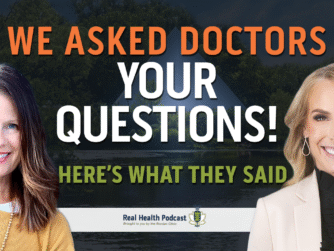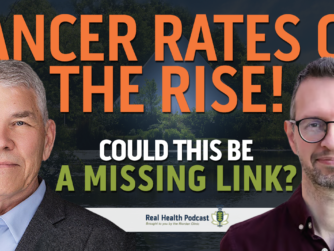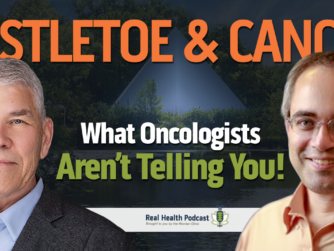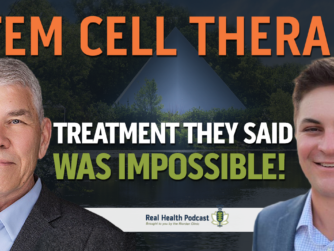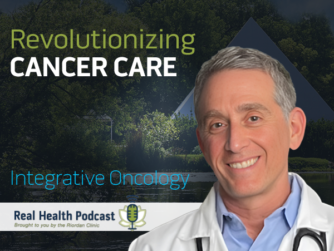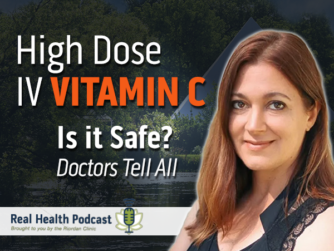In this episode of the Real Health Podcast, Dr. Lucas Tims, ND, FABNO, and Megan Van Zyl, MA, NTP, owner and CEO of the Cancer Peace University, discuss the role emotions can play in the root causes of cancer. Cancer Peace University takes a terrain approach with clients to find the sources of emotional trauma that may have contributed to a cancer diagnosis.
Watch the Video
Thank You to this Episode’s Sponsor
Links
Riordan Clinic: https://riordanclinic.org/
Megan Van Zyl, MA, NTP, owner and CEO of the Cancer Peace University
Website: https://cancerpeaceuniversity.com
Books are available online:
Braving The Storm book by Megan Van Zyl
Braving The Storm workbook by Megan Van Zyl
Sign up for the Cancer University Workshop:
https://cancersolutionworkshop.com/sign-up
Read the Transcript
Disclaimer: The information contained on the Real Health Podcast and the resources mentioned are for educational purposes only. They’re not intended as and shall not be understood or construed as medical or health advice. The information contained on this podcast is not a substitute for medical or health advice from a professional who is aware of the facts and circumstances of your individual situation. Information provided by hosts and guests on the Real Health Podcast or the use of any products or services mentioned does not create a practitioner, patient relationship between you and any persons affiliated with this podcast.
Intro: This is the Real Health Podcast brought to you by Riordan Clinic. Our mission is to bring you the latest information and top experts in functional and integrative medicine to help you make informed decisions on your path to real health.
Lucas Tims: Okay everyone, thanks for joining us again for another episode of the Real Health Podcast. I am your host today, Dr. Lucas Tims, and I’m very excited to welcome our guest today, Megan Van Zyl. Megan is the owner and CEO of Cancer Peace University, an organization that has a goal of setting cancer patients free of the fear of cancer. Megan has a master’s degree in Human Development Counseling from Vanderbilt University, as well as an honorary PhD and has been working with cancer clients for nearly 20 years now. She’s also an author of several books, the most recent of which we’ll be kind of diving into today called “Braving the Storm.” So with that said, Megan, thank you so much for being with us.
Megan Van Zyl: Thank you so much Dr. Lucas for having me today. I’ve really been looking forward to this interview.
Lucas Tims: As have we. We’re going to talk about some really important stuff today, important aspects of cancer care and addressing root causes of cancer that I don’t think get talked about enough. So I think our audience will really appreciate the information you have to share. I want to start just by letting you introduce yourself in terms of your journey and how you came to work in this field and how you set up Cancer Peace University.
Megan Van Zyl: Great, thank you. That’s perfect. So I initially, after receiving my master’s in Human Development Counseling, I initially worked with children with autism with ABA therapy. And it was through my journey with working with children with autism that my eyes were open to holistic healing, to the natural world of healing because so many families I worked with were pursuing alternative modalities like chiropractic care, naturopathic doctors, functional medicine. And I started to incorporate that with my work with children with autism. And shortly after that, I had a friend diagnosed with breast cancer. She was only 47 years old. She was a single mom. She had two children with special needs, three children total. And she had a lot of stress in her life, and I became an advocate for her because of my work with children with autism, I started to do a lot of research for her and tried to come up with protocols for her because she didn’t have a lot of finances to invest in her journey.
So I really became an advocate for her and I saw a lot of things that were hard to see in the cancer world. I saw that she didn’t get adequate care, that when she would go to her oncologist, she would have five minutes with the oncologist, and some of the recommendations were hard for her to process, and she wasn’t able to answer the questions to understand why she developed breast cancer. So it was through that journey that I walked with her for about a year and a half that led me to cancer. And unfortunately she died of liver failure. And I really had a decision to make after grieving the loss of my friend, was I going to continue in the field of autism and walk away from cancer or was I going to walk that vulnerable path with cancer patients that I had walked with my friend? And I chose the latter, I chose to pursue cancer after that.
Lucas Tims: Yeah. Well, we’re glad you did, and we’re glad that that led to you forming or becoming an author, writing books, working with many clinics, and forming this organization, Cancer Peace University. Tell us a little bit about the mission of that and how that all came together.
Megan Van Zyl: Yes, I’d love to. So Cancer Peace University really developed over years of me being in practice with cancer patients. And what I realized was several things. I realized that cancer patients were struggling to make treatment decisions because they didn’t understand their diagnosis. And so many times cancer patients were becoming passive recipients of treatments with no active involvement in their own care. And that became a big concern of mine. And I remember the moment that I was working with a client with breast cancer, and after weeks and a couple months of telling her about why cancer develops in the body, she had this epiphany moment where she told me one factor of why she got cancer. She had a light bulb moment that shifted her process in a really positive way. She told me, she said, “Well, if I have cancer because of all of the toxins I’ve been exposed to, the liver congestion, why am I using a toxin to try to cure myself?”
And she ended up going through a process of really getting into spontaneous remission from breast cancer after she was able to be empowered to understand her diagnosis and make better treatment choices. And that really led me to this process of developing curriculum because I realized that there needed to be education. I realized I didn’t have enough time with my cancer patients, I would have 90 minutes every two to three weeks with a cancer patient, and it wasn’t enough time to educate them. So I started this path of building the curriculum. And then once I started to help clients move through the curriculum, I realized that I wanted to support integrative clinics because I know so many integrative clinics are doing great work on the physical side, but I saw such a need for emotional support, which is a lot of what I do with cancer patients.
Lucas Tims: Yeah, I think that need is huge. And that was one of the reasons I think that we initially connected, was I’ve been working in integrative oncology for 13 years now and feel like I’ve been able to really help people with more of the physical and biochemical and toxicity, underlying issues for cancer that exist on that plane. But also seeing a lot of patients that I knew there were other aspects of their condition on the mental, emotional, or spiritual side that were contributing to their disease, but I didn’t really have the tools or a curriculum or a pathway for which to put patients on to help them address those issues.
And so finding you, finding Cancer Peace University through some of our mutual patients, I think really was a godsend really, because the more we’ve gotten to know about your programs and curriculum, it seems like it aligns perfectly with our views and approach in terms of looking at the terrain of cancer, realizing that cancer is not just a spontaneous random sort of occurrence in the body, and that there’s always a root cause to it. And your books are, at least the book that I’ve read here, “Braving the Storm,” there’s kind of a central theme through this talking about spontaneous remissions and some of the research around that and the fact that these spontaneous remissions are all sort of connected by these profound internal transformations that patients have. Can you speak to that a little bit more? I mean, how can we help patients experience these transformations?
Megan Van Zyl: Thank you. This is one of my favorite topics, so I’m so excited to share more with the listeners. So one of my favorite research projects on cancer came out of Japan, and they found that spontaneous remission from cancer occurred within 24 hours of that profound internal transformation that you were speaking about. And I just think that is so deep, and I think we could just think about that for days of what does that mean to go through a profound internal transformation? And to me, it speaks to a paradigm shift emotionally, a paradigm shift spiritually, a better alignment with a true sense of self, a better expression of your individuality and who you are. And there’s so many aspects to it that we can speak to, even purpose. A lot of cancer patients end up finding a more clear purpose and realizing that their life hadn’t had a lot of purpose prior to a cancer diagnosis.
And so many things can become clarified during a cancer journey. But one of those things is looking at past trauma, and there’s so many layers to past trauma. And one of those layers is childhood experiences that end up building someone’s core belief system in their subconscious mind. And so from womb to seven, we’re developing our worldview or our core belief system basically through the conclusions we come to based on our interactions with our world, with our parents, with what we’re exposed to. And some of those conclusions are good and positive and some are negative and will impact our body and our psychology in a negative manner.
Lucas Tims: Yeah, I think that’s so fascinating that so early on in life that programming is happening. And so we think when kids are so young, it’s like, oh, we talk around them and we almost act like they’re not there. Or we might have conversations and be making big life decisions and the kids are, they’re sponging all that up, and this is helping to form these neural pathways in their body, which connects not only their brain and their body, but their immune system, their interpersonal skills and relationships, and really helps us to see how that mind body connection can affect everything that happens in our health and wellness. So can you speak to some of the science in terms of, I know a big term out there’s Neuroplasticity, right?
Megan Van Zyl: Yes.
Lucas Tims: So what are some of the real seminal findings that have allowed us to make these connections between these early childhood experiences, trauma, how our brain networks get set early on. And then how that actually scientifically leads to the outcomes with health and disease?
Megan Van Zyl: Great. Big question. So very big question. So there’s a lot of different paths that I can take to answer that question, but basically we need to understand a lot of things in terms of how trauma impacts the body. And part of it is understanding quantum physics principles. So we live in a quantum universe, our bodies really are wired more like a piano that’s out of tune than necessarily anything else. There’s the biochemistry aspect, but energetically, our body is communicating through electric impulses and frequencies in the body. And what happens when the core belief system is developed in the subconscious mind, is that we develop thought patterns and emotional patterns based on our belief system that carry certain frequencies. And research out of Eastern State University in 1992 found that a healthy frequency during the day is from 62 to 68 hertz. And when that drops below 62 hertz, that our immune system starts to become compromised.
And so the frequency is really impacted a lot by a core belief that feeds a negative loop of a thought pattern, an emotional pattern that carries a lot of negative energy, acidic energy, and frequency that really brings down an energy flow in the body and even can block an energy flow in the body. And so really what I work on with clients is yes, there is trauma in adulthood that is more easily identified, but there are childhood experiences that have influenced our belief system that will impair how we perceive the trauma in adulthood, but also will communicate in a manner of giving frequency that can contribute to disease in the body.
Advertisement: There’s a lot more to this conversation and it’s coming up right after a quick break. Today’s podcast is brought to you by LivOn Labs makers of Liposomal vitamins and supplements. LivOn uses a liposomal encapsulation technology to protect nutrients from destruction in the digestive system. This allows for more efficient delivery of essential vitamins and nutrients. Choose from various supplements that support health and wellbeing such as LypoSpheric Vitamin C, Magnesium, Glutathione and more. To learn more visit livonlabs, that’s L-I-V-O-N labs.com.
Lucas Tims: It certainly is a very interesting way to look at the physical body and how our experiences and our belief systems affect that. So obviously as you start working with patients, you’re trying to peel back the layers of these early childhood experiences and traumas they’ve been through. What does that work look like? Are there religious aspects to it? Is it more so finding what patients are comfortable in terms of how they talk about those things? Is there a core sort of theme that you use with patients in actually doing that work?
Megan Van Zyl: That’s a great question. So there’s different layers to what we work on in our programs with Cancer Peace University. So we have the layer of the cancer support group where cancer patients come together and they share emotionally how they’re feeling, where they’re at on their journey. And that has actually shown to make a big difference in survival outcomes by itself. Dr. Spiegel did a lot of research on group therapy and cancer patients, and he actually found that having group support with interventions, psychological interventions, psychological homework, journaling, and learning to be more in touch with your emotions to double survival outcomes in stage 4 metastatic breast cancer situations. And that is incredible by itself. But that’s just one aspect of what we do. Really how we view a psychological intervention for cancer is we look at how to innovate the conscious with a subconscious mind, because sometimes we end up not having an awareness of the core beliefs or the memories that are impacting our psychology on a daily basis.
And so part of what we work on with cancer patients is developing mindfulness. Now, a study done in the 1990s found that cancer patients tend to carry something called the Type C personality, where at some point a lot of cancer patients end up learning to suppress their emotions. And if we learn to suppress our emotions, then we have a hard time having that mindfulness or awareness of the emotional connections between the conscious and subconscious mind, which can hinder really what we’re trying to spur on what we talked about earlier is a profound internal transformation. We cannot have a profound internal transformation where there’s a lack of awareness, a lack of mindfulness, or a lack of emotional intelligence. So some of what we do is really working on developing that emotional intelligence, becoming more of a curious observer of our internal world, and just allowing what root causes on the emotional level are there to surface, if that makes sense.
Lucas Tims: Yeah, totally does. I mean, we deal a lot with sort of biological or chemical toxins in people, but you could make a case for the emotional toxicity. Whether that’s those traumatic experiences or loss of loved ones, unprocessed grieving. These things can be stored in the body just like a heavy metal or a mold or some other toxic source. And so that definitely connects the dots for me there. How quickly can you see these transformations in people? Is it something where literally overnight there can be a change or does it take years of work? What can people expect if they kind of go down this road with you?
Megan Van Zyl: Yeah, so that’s a great question. So I would say typically it’s between three to nine months, where we can really see that internal shift. One of my favorite stories was with a client who had stage 4 metastatic ovarian cancer, and she initially came to us basically having the best of integrative care, the best of getting to the physical root causes but her cancer was still progressing. She intuitively felt that she had not resolved the trauma of losing her son. And that was really something that she carried into starting to work with us at Cancer Peace University. And so we did a lot of work on even memories. So we have cancer patients write their timelines of trauma, they write timelines of trauma from being a child from when they’re an adult, and then we start going through their timelines of trauma and really helping them process and integrate that in a very specific way to help shift the frequencies and shift the internal reality.
And so I started working with her and I would say it took about three to four months, we had gone through her entire timeline of trauma. Really working on redesigning memories, integrating the conscious and subconscious releasing trauma. We have a lot of different strategies on how we do that. And before our last session, she ended up getting a clear scan. She was NED, and she really felt that the emotional root side made a big difference for her. She was finally able to shift and release that trauma. And those are the type of stories that we love. We love just helping people find the path towards that type of spontaneous remission by looking at emotional roots and specifically trauma.
Lucas Tims: That’s amazing when they can see those types of results. We had a patient, mutual patient that had a similar type experience, which was really what got me interested in connecting with you. Patient had lost a son leading up to their diagnosis, and she knew, even when she came to me, she was like, “I know that this is part of my puzzle is I have not been able to process the loss of my son.” And I think you were able to work through that with her, and it led to a much better response to treatments and ultimately getting into remission.
Megan Van Zyl: Wow.
Lucas Tims: So I’ve seen it play out in real life and in patients that we’ve managed together, so thank you for that. One last question I have for you is we work with a lot of breast cancer patients. That’s a very common type of cancer. And would you say that amongst certain cancer types that you see certain common threads or themes of trauma abuse? And could you speak to that a little bit?
Megan Van Zyl: Yes, that’s another great question. So because our overall goal is really to find the story, the emotional root story to the cancer, which does end up being very cohesive to your goal in finding the physical root cause. Our goal is really to build that story of why did you develop cancer on an emotional level and different types of cancer end up manifesting in the body for different reasons. I love the work of Dr. Hammer because he really clarified a lot of this in his work in finding that when he would look at CT scans of the brain, he would actually be able to diagnose the cancer based on where there was a rippling effect in the brain connected to an area of the body. And he would say, “Well, this area of the brain is connected to this part of the body, so cancer must be manifesting here.”
And what we really find with breast cancer is we find that there tends to be a separation conflict. The separation conflict in a relationship can look different depending upon the person. It can be a separation from a spouse, from a child, it can be from the loss of a child. It can be either an abortion or the death of a child. It also can be the loss of a loved one, a spouse, or even the loss of a friendship. And even my friend that developed breast cancer so many years ago, I remember talking through the many relational losses she had. She grew up with a mother with MS, did not feel emotionally connected or nurtured by her mother because her mother had MS and couldn’t properly care for her children. She also had two divorces, lost several friendships, and all of that compounded and was part of, in my belief, the development of breast cancer in her body.
Lucas Tims: Yeah. Definitely from our end, we tend to see common themes and underlying issues in certain cancer types, but everyone really is their own puzzle. Like you said, you have to figure out what each person’s story is individually. But thanks for sharing that. I think we’re going to leave it at that today. Thank you so much for joining us and sharing this information with our audience. I definitely would encourage everyone listening to check out Megan’s book, one of her books, “Braving the Storm,” as well as the accompany workbook. These are a great place to start, wouldn’t you say, Megan?
Megan Van Zyl: Yes.
Lucas Tims: And then any other ways that you’d want to talk about that people could connect with you?
Megan Van Zyl: Yeah, that’s a great question. So I actually have a workshop, so if people want to join the workshop, it’s called the Three Step Cancer Solution, and we’ll be providing the web link if people want to review that. And that’ll go through more details of what is cancer on the emotional side and even more of the sciencey type topics that people tend to like.
Lucas Tims: Fantastic. Well, big fan of your work. Thank you for joining us, and I’m sure we’ll see you down the road.
Megan Van Zyl: Great. Thank you Dr. Lucas. Really appreciate it.
Outro: Thank you for listening to the Real Health Podcast. If you enjoyed this episode, be sure to subscribe and leave us a review. You can also find all of the episodes and show notes over at realhealthpodcast.org. Also, be sure to visit riordanclinic.org where you will find 100’s of videos and articles to help you create your own version of Real Health.


